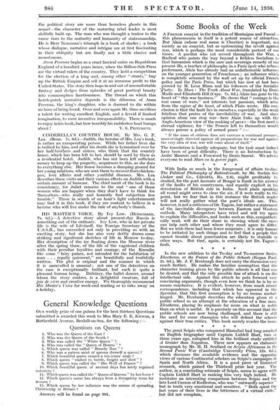Some Books of the Week
A- FRENCH essayist in the tradition of Montaigne and Pascal-. this phenomenon in itself is a potent source of attraction. But Alain (whose real name is Chartier) is important, not merely as an essayist, but as epitomizing the revolt against war, which is perhaps the most considerable portent of our times. A pacifist who yet served throughout the War, a Radical who points the way beyond a feckless Socialism to that humanism which is the sure and sovereign remedy of our present ills, a teacher of philosophy in a Paris /wee who refuses preferment, Main has already had an unfathomable influence on the younger generation of Frenchmen ; an influence which is completely screened by the wall set up by official French policy and the Paris Press, but which has now at last been pierced by M. Leon Blum and his followers of the Socialist Tarty. In Mars : The Truth About War, translated by Doris Mudie and Elizabeth Hill (Cape. 7s. 6d.) Main has gone to' the heart of " this war business." He shows that " courage is the real cause of wars," not interests but passions, which arise from the region of the heart, of which Plato wrote. His con- clusion is that the fault lies in ourselves, especially in the weak fatalism that prates of the inevitability of war. And since opinion alone can stop war—here Alain links up with the Anglo-American view of the making of peace—the first need is eternal vigilance, for " the Powers left to themselves would always pursue a policy of armed peace " :—
" If the mass of citizens does not exercise a continual pressure. unswervingly directed against all preparations for war and against the very idea of war, war will come about of itself."
The translation is hardly adequate, but the task must indeed have been of great difficulty. There is an Introduction by Andre Maurois and a Foreword by Denis Saurat. We advise everyone to read Mars ou la guerre jugee.


































 Previous page
Previous page